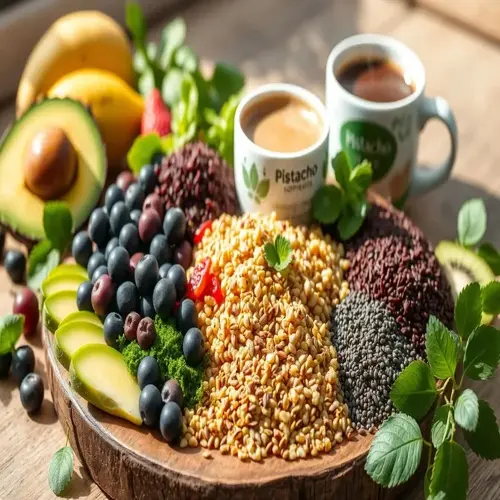10 Collagen Boosting Foods for Healthier Skin

Written by
Natalie Hamilton
Reviewed by
Prof. Benjamin Murphy, Ph.D.Give preference to collagen-enhancing foods such as bone broth and citrus for their direct supply of amino acids.
Pair foods containing Vitamin C with collagen sources in order to enhance synthesis and absorption ability.
Incorporate one serving of nuts, seeds, and greens each day to supply essential mineral cofactors.
Alternate your sources of animals and plants 3-4 times a week for a variety of nutrients.
Notice existing skin improvements in 3-6 months of being on a dietary collagen supplement.
Avoid high sugar foods and caffeine near meals as these can degrade collagen.
Article Navigation
Foods that boost collagen are sources of the building blocks for your body's most plentiful structural protein. Collagen is the scaffolding of your body, keeping your skin firm and your joints strong. Beginning around age 25, natural collagen production starts to decline by approximately 1% per year. This affects the elasticity of skin, as well as the comfort of joints.
Unlike supplements that often offer short-term fixes, whole foods provide you with bioavailable nutrients that your body actually uses. I have seen people transform the texture of their skin simply by adding collagen-rich meals. Focus on adding foods rather than taking them away. This approach feels sustainable long-term.
How Collagen Production Works
Three essential amino acids are needed by the body to make collagen: proline, glycine, and hydroxyproline. These result in the triple helix structure that gives strength to the tissues. They are like re-bar rods in concrete. If there is a deficiency of these building blocks, then the material will not reproduce the same amounts of collagen as before.
Vitamin C is like a construction foreman of collagen. It transforms Proline into Hydroxyproline through hydroxylation. Without enough vitamin C, this transformation won't occur. I've seen slow wound healing and poor skin integrity in my clients who are low in citrus.
Fibroblast cells in your skin are collagen factories. They weave amino acids into strong collagen fibers. Starting around the age of 25, these cells become less effective, and collagen production decreases by approximately 1% per year. This natural decline is evident in the texture of your skin and the stiffness of your joints.
Supporting adequate fibroblast functioning becomes more important with age. These cells thrive on nutrient-rich foods. A steady supply of foods that promote collagen helps sustain production. This is like keeping factory machines oiled and working despite normal wear and tear.
Amino Acid Assembly
- Collagen formation begins with three essential amino acids: proline, glycine, and hydroxyproline. These molecular building blocks combine in specific sequences to create collagen's unique triple-helix structure that provides structural integrity to skin and connective tissues.
Vitamin C Activation
- Vitamin C serves as a crucial catalyst that enables enzymes to convert proline into hydroxyproline. This biochemical process stabilizes collagen molecules, allowing them to form strong fibrous networks that maintain skin elasticity and tissue strength throughout the body.
Fibroblast Synthesis
- Specialized cells called fibroblasts assemble amino acids and vitamin C into procollagen within cellular structures. This precursor molecule undergoes modifications before being secreted into extracellular spaces where it transforms into mature collagen fibrils.
Structural Formation
- Mature collagen fibrils organize into cross-linked networks that provide tensile strength to skin, tendons, and bones. This intricate scaffolding resists stretching forces while maintaining flexibility, creating the foundation for youthful-looking skin and mobile joints.
Age-Related Decline
- After age 25, collagen production decreases by approximately 1% annually due to reduced fibroblast activity. External factors like UV exposure and oxidative stress accelerate collagen breakdown through enzymatic degradation, leading to visible aging signs.
Continuous Renewal
- The body constantly remodels collagen through balanced synthesis and breakdown processes. Nutritional support from collagen-boosting foods provides amino acids and cofactors needed to maintain this equilibrium and support tissue repair mechanisms.
Key Nutrients for Collagen
Vitamin C has a dual role for collagen, enabling the conversion of proline to hydroxyproline, the vital building block of collagen. It is also a powerful antioxidant that protects existing collagen fibers from environmental agents such as UV rays and pollution.
Animal sources, such as bone broth, supply the body with direct collagen peptides for efficient absorption. In contrast, plant sources provide the body with precursor amino acids that must be converted into other amino acids. I have noticed many of my clients with digestive issues benefit from the best bioavailability and variety when they combine both types of sources.
Various minerals serve as cofactors during different stages of collagen synthesis. Zinc acts to activate those enzymes that synthesize the strands of the collagen framework. Copper provides the essential bonding characteristics that glue the sections together into one monolithic framework. The sulfur in the garlic forms disulfide structures to help reinforce this framework of collagen, much like steel wires.
Nutritional synergy makes collagen work better. Citrus is paired with copper-containing sesame seeds. Vitamin C converts copper to its active form, which strengthens the collagen bonds. This combination is significantly superior to isolated nutrients for a lasting effect on the skin and joints.
10 Collagen Boosting Foods
These ten collagen-boosting foods accommodate a variety of diets. Animal sources such as bone broth provide direct collagen peptides. Plant-based sources, such as citrus fruits, provide vitamin C, which is essential for the synthesis of collagen. Each has its own unique compounds which promote the health of skin and joints through different pathways.
Glycine and proline, easily absorbed amino acids, are also found in bone broth, so sip a cup daily with herbs for continuous collagen support. Salmon is a source of omega-3 fatty acids that help reduce inflammation, which can damage collagen. Eat portions of fish with skin two times a week for the benefits of zinc, as well.
The combinations of nutrients in plant foods are outstanding. Bell peppers contain vitamin C, while garlic provides sulfur compounds. Mince garlic to add to stir-fries to attain the benefit of its collagen-building properties. Pair citrus fruits with almonds to reap the benefits of vitamin C and vitamin E.
Maximize benefits through proper pairings. For optimal results, combine berries and chia seeds in smoothies for a nutritious boost. The vitamin C in berries helps enhance collagen production, while chia seeds supply copper to strengthen the fiber. Pair tofu and broccoli to provide a combination of isoflavones and sulfur.
Animal vs. Plant Sources
Animal sources provide you with direct collagen peptides that have high bioavailability. Bone broth and fish skins provide glycine and proline, which your body readily absorbs. Plant sources deliver nutrients like vitamin C that turn on your body's natural production of collagen instead of direct collagen.
Certain vegetable foods, such as soy, possess complete amino acid profiles. Isoflavones present in soy stimulate the activity of fibroblasts, similar to the animal element of collagen. For vegetarians, the combination of legumes with citrus fruits forms the basis of the collagen-building material. Vegan substitutes are plant-based proteins rich in zinc, fortified with additional nutrients.
The combination of animal and plant sources offers a great synergy. A salad made with salmon and peppers provides marine collagen and vitamin C, enhancing their absorption. Bone broth with garlic provides sulfur and peptide compounds that facilitate better collagen cross-linking.
Customize your food selections based on your dietary choices, with an eye toward health benefits. Incorporating bone broth during the week and berries daily can benefit omnivores. Vegans can choose lentils, soy, and pumpkin seeds as their protein sources. I have helped clients on every eating plan achieve visible skin improvements based on food combinations.
Incorporating Collagen Foods
Eat foods that consistently boost collagen for optimal results. Eat fruits high in vitamin C daily, like an orange or 150 g of berries. Eat foods derived from animals, such as bone broth, three times a week, consuming 240 ml. Eat plant-based foods, such as 85g of tofu, daily.
Plan meals for maximum absorption timing. Collagen-rich foods should be taken at the same time as vitamin C-containing foods. Animal protein should be consumed in the evening when tissue repair is at its peak. Nuts and seeds should be consumed in the morning as snacks with citrus fruits.
CHANGE THE PLAN AS NEEDED TO SUIT DIETARY NEEDS WHILE NOT SACRIFICING THE BENEFITS OF THE PLAN. FOR DAIRY-FREE USE, ALMOND MILK IN BERRY SMOOTHIES. CHICKEN CAN BE LEFT OUT IN LOW RECOVERY FOODS, AND BONE BROTH USED IN PLACE OF MUSHROOM BROTH FOR VEGANS. FISH CAN BE SWAPPED FOR TEMPEH IN SALADS IF NECESSARY. I HAVE DONE PLANS FOR PEOPLE WITH GLUTEN SENSITIVITY BY HAVING THEM USE QUINOA.
By avoiding common mistakes that reduce effectiveness, you will increase its effectiveness. Space coffee at least an hour away from collagen meals. Limit added sugar to less than 25 daily. Cook garlic before you eat it to activate the sulfur compounds. These easy fixes will allow your work to be more effective.
Morning Routine
- Berry Smoothie: Blend 1 cup berries (150g), 1 scoop collagen peptides (10g), 1 tbsp chia seeds (15g) in almond milk
- Egg White Omelet: 3 egg whites with ½ cup spinach (30g) and sliced bell peppers
Lunch Enhancements
- Salmon Salad: 4 oz grilled salmon (113g) over 2 cups mixed greens with citrus dressing
- Lentil Bowl: ½ cup lentils (100g) with roasted garlic and cruciferous vegetables
Dinner Pairings
- Bone Broth Soup: 1 cup broth (240ml) with shiitake mushrooms and seaweed
- Tofu Stir-fry: 3 oz tofu (85g) with broccoli and sesame seeds
Avoidance Tips
- Limit: >25g added sugar daily to prevent glycation damage
- Space: Coffee 1 hour before/after collagen foods to avoid iron inhibition
Snack Options
- Citrus-Nut Combo: 1 orange with 1 oz almonds (28g)
- Veggie Dip: Bell pepper strips with hummus (3 tbsp/45g)
5 Common Myths
Many believe that collagen supplements are superior to natural food if they wish to optimise their skin health yields.
Science indicates that food yields synergistic nutrients intolerable in isolated supplements. While isolated collagen peptides allow sufficient bioavailability, whole food integrators such as citrus fruits and collagen containing bone broth foods (which nourish the proliferating cells of the skin) impart vitamin C, Zinc and enzymatic cofactors and antioxidants, which store in the tissue and permit natural production of collagen within the tissue (skin) to take place and ultimately continue to protect the skin from environmental degradation.
There exists a persistent misconception that plant-based diets cannot adequately support the body's collagen production mechanisms
Research demonstrates plant foods actively stimulate collagen synthesis through multiple biological pathways. Soy isoflavones boost fibroblast cellular activity, vitamin C-rich produce enables crucial proline-to-hydroxyproline conversion, and mineral sources like pumpkin seeds provide zinc for enzymatic reactions that maintain collagen structural integrity throughout the body's connective tissues.
A widespread marketing myth claims topical collagen creams can effectively reverse wrinkles and restore skin elasticity
Dermatological studies prove collagen molecules are too large to meaningfully penetrate the skin barrier. While moisturizers may temporarily plump surface layers, lasting improvement requires internal nutritional support through dietary amino acids and cofactors that systematically rebuild collagen matrices from within over consistent 8-12 week periods.
Some people mistakenly think that a high collagen intake from natural sources causes detrimental health side effects
It is confirmed by clinical nutrition information that natural whole-food sources of collagen metabolize safely and pose no risks at all. Unlike concentrated supplements, the balanced dietary intake of collagen poses no stress to the liver or kidney for the body regulates amino acid intake rapidly and eliminates the excess naturally during normal physiological functions through recognized metabolic pathways.
Many product advertisements make false promises that income collagen dominated diets guarantee visible anti-aging results instantly.
Time lines which are biological give the regenerate of collagen meaning that the nutritional support must be continued. Although improvements in hydration may be showing after a few weeks, changes in structure such as a reduction in wrinkle lines will only happen with a continued nutrition plan for 3-6 months in order to build back up the extracellular matrix by the liberating of continuous activity of fibroblasts and the remodeling of tissues that are occurring.
Conclusion
Collagen remains the essential matrix for maintaining flexible joints and firm skin throughout the body. It is the structural foundation that makes the tissues sturdy. Continued nutrition is beneficial for maintaining protein levels. Whole foods are more essential than temporary methods to attain lasting results.
Prioritize food diversity and variety in your daily meals. Rotate animal and plant sachets, e.g., bone broth and berries. Aim for three collagen-based meals weekly and supplement daily with vitamin C. Consistent, small efforts yield better overall results than infrequent, large efforts.
Prioritize sustainable solutions over quick fixes. Consistent feeding with gradual improvements is more effective than radical changes. I have had clients with glowing skin simply from adding a fruit to breakfast and some nuts to a snack. Long-lasting change only comes from adopting and maintaining healthy eating habits.
You can positively impact your collagen health every day through your daily choices. Choose whole foods that provide your skin and joints with the essential nutrients they need. Start with just one collagen-boosting meal tomorrow. Your body will reward you with greater resilience and vitality.
External Sources
Frequently Asked Questions
Which foods contain the highest natural collagen?
Animal connective tissues like bone broth and fish skin provide direct collagen peptides. For plant-based options, soy products and legumes offer amino acids that support collagen production when combined with vitamin C-rich foods for optimal synthesis.
How can I restore collagen in my facial skin?
Rebuild facial collagen through consistent intake of collagen-boosting foods like bone broth and citrus fruits. Support this with mineral-rich nuts and seeds while avoiding sugar and excessive sun exposure to prevent collagen breakdown over time.
Do collagen supplements cause digestive issues?
Whole-food collagen sources rarely cause discomfort, unlike some concentrated supplements. When consumed as part of balanced meals, bone broth and other natural sources provide collagen peptides without triggering heartburn or digestive distress in most individuals.
What drinks effectively boost collagen levels?
Nutrient-rich beverages include:
- Bone broth: Provides glycine and proline
- Citrus-infused water: Enhances amino acid absorption
- Berry smoothies: Deliver vitamin C for collagen formation
Can dietary changes reverse collagen loss?
Strategic nutrition can gradually restore collagen. Focus on daily vitamin C sources, weekly animal collagen foods, and mineral cofactors from nuts/seeds. Visible improvements typically emerge after 3-6 months of consistent dietary support for skin and joints.
How does caffeine affect collagen integrity?
Caffeine temporarily inhibits collagen absorption when consumed near meals. Space coffee/tea at least one hour before or after collagen-rich foods to prevent mineral interference while still enjoying your daily beverages moderately.
Which plant foods best support collagen production?
Top plant-based collagen boosters include:
- Bell peppers: High in vitamin C
- Garlic: Provides sulfur for collagen strengthening
- Soy products: Contain fibroblast-stimulating isoflavones
- Leafy greens: Offer chlorophyll and antioxidants
Do collagen-rich foods benefit joint health?
Yes, collagen foods directly support joint tissue. Bone broth supplies cartilage-building compounds while zinc from seeds aids repair. Combine with omega-3 sources like salmon to reduce inflammation and improve mobility over several months.
What nutrients are essential for collagen formation?
Key collagen-supporting nutrients include:
- Proline/Glycine: Found in bone broth and eggs
- Vitamin C: From citrus and berries
- Zinc/Copper: Abundant in nuts and seeds
- Sulfur compounds: In garlic and onions
Can dietary collagen replace topical skincare?
Nutritional collagen support works deeper than topical products. While creams offer surface moisturizing, consistent intake of collagen-boosting foods addresses structural repair at the cellular level for more sustainable anti-aging results over time.

